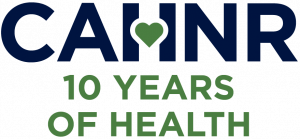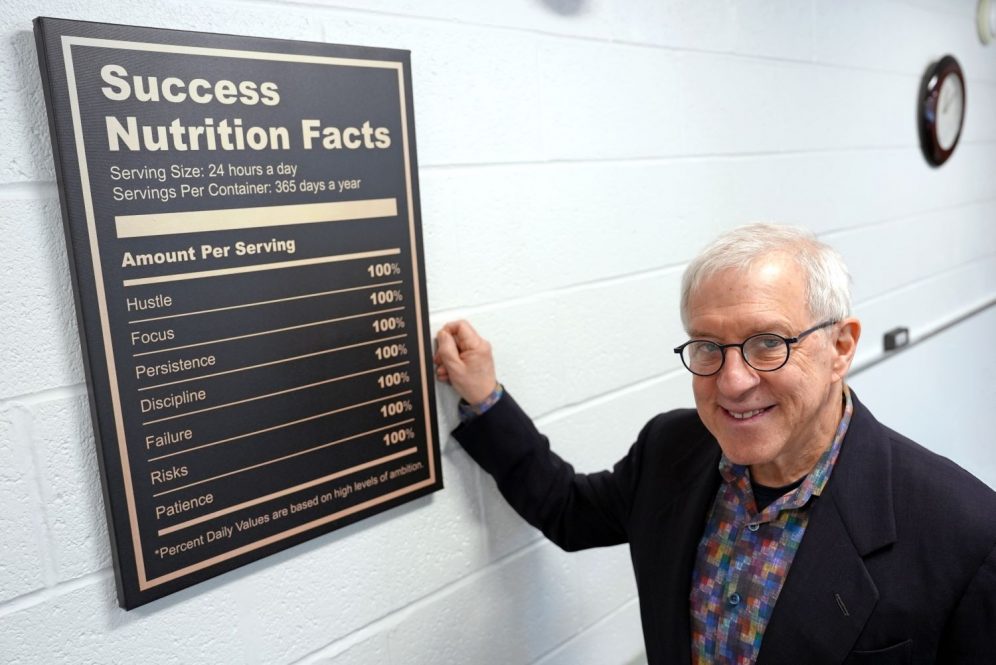Jerold “Jerry” Mande ’78 (CAHNR) has spent decades working to improve Americans’ health.
Mande will deliver the commencement address for the College of Agriculture, Health and Natural Resources on May 4, 2024.
From efforts to reduce tobacco use, to creating the organ doner matching system with Al Gore, and collaborating with former first lady Michelle Obama to improve the nutrition of school meals – Mande has worked on major health initiatives with some major players in Washington, D.C.
 But all this work began at UConn when Mande was an undergraduate student studying nutritional sciences.
But all this work began at UConn when Mande was an undergraduate student studying nutritional sciences.
In 1976, the FDA banned products that used amaranth, the basis for Red Dye No. 2. This ban was because of the link between this dye in foods like red M&Ms to an increased cancer risk. Mande was mystified by the decision and wanted to learn more about the nutritional science behind it.
“I knew enough to know that diet indeed was a leading risk factor of cancer, but it was probably more basic parts of the diet, not the red dye,” Mande says. “I was perplexed [as to] why the FDA would choose to ban red dye and not do something more meaningful in terms of changing the way we were eating.”
Since then, unfortunately little has changed. In fact, as Mande explains, things have gotten worse.
Americans, including children, suffer increasingly high rates of diet-related illnesses such as diabetes, fatty liver disease, cancer, and cardiovascular disease. Currently 42% of the U.S. population is obese, more than tripling since the 1960s.
“It’s really sad and a catastrophe for the nation how sick we are,” Mande says. “It keeps me working, because I am convinced that we can make progress.”
When Mande graduated with a degree in nutritional sciences and minor in art, both of which he credits as foundational for the rest of his career, he realized he didn’t want to work with people one-on-one as a nutritionist.
“That is such critical important work,” Mande says. “But you work with a person one at a time and hope to change them, and I had enough insight into myself to know I didn’t have the patience to do that. I wanted to work at a scale of possibly a million people at a time.”
Mande continued his education earning his master’s degree in public health at the University of North Carolina at Chapel Hill.
He then began his career as a visiting scientist in the FDA. Fittingly, it was the same branch that made the decision to ban red M&Ms.
In what is probably his most recognizable accomplishment in our day-to-day lives, Mande is the man behind the nutrition labels on all our food. Mande says the minor in art he earned at UConn came in handy on this project as he had an aesthetic background the other scientists lacked.
“It’s very popular,” Mande says. “Consumers depend on it. It is important and I was glad to play that role.”
Mande later worked on tobacco regulation during the Clinton Administration. This remarkably successful effort led to a marked reduction in tobacco use, especially among children. Today, less than 2% of American youth are cigarette smokers.
Mande says one of the major takeaways from his work on reducing tobacco use was that the government’s campaigns were most effective in changing behavior when they focused on children’s health, something he is applying to nutrition with his non-profit organization, Nourish Science.
“I learned that we can do big things, and I knew exactly what it would take to have a similar success around food,” Mande says.
One of Nourish Science’s goals is to ensure every child in the U.S. can reach age 18 at a healthy weight and in good metabolic health with the support of government nutrition programs like WIC (Women, Infants, and Children) and SNAP (Supplemental, Nutrition, Assistance Program). Currently, SNAP, the largest nutrition program in the U.S. serving 41 million people, does not have any requirement to meet federal nutrition guidelines.
“We are not this sick because individuals are making bad choices. The answer is not to help them make better choices,” Mande says. “That plays a role. But [the system] has to be set up so that the choices there for them are healthier choices.”
Mande believes the key to achieving this goal is through the programs millions of Americans already access.
For example, during the Obama administration, the government enacted and Mande helped implement the Healthy, Hunger-Free Kids Act setting new school meal standards. It was part of Michelle Obama’s effort to reduce childhood obesity. It worked. Using the Healthy Eating Index which measures how well people follow federal nutrition guidelines, the average score for school meals, and the general population, was 58 out of 100. After introducing the new school meal standards in 2013, the scores of these meals increased to 82 within three years.
“It shows what government can do,” Mande says. “I know we can do it.”
Nourish Science also advocates for the need for more research on what is causing the current diet-related health epidemic in the U.S, particularly the sharp increase in obesity. Currently less than 5% of the National Institutes of Health budget goes toward nutrition-related research.
“We know a lot and we’ve learned so much more since I graduated,” Mande says. “But we still can’t answer that basic question.”
Food For Thought
As CAHNR celebrates the 10th anniversary of health being added to the College name, Dean Indrajeet Chaubey says it is only fitting that someone like Mande speak with the class of 2024.
“Jerry’s career underscores the value of a holistic, diverse, and visionary approach to health and nutrition policy, and he has worked with the highest levels of national government to put that vision into action,” says Chaubey. “Given the impact that Jerry’s work has had on thousands of Americans’ health, we know he’ll provide invaluable ‘food for thought’ for our students.”
Mande says his work is, overall, dedicated to making the world a better place, a guiding principle he encourages people, including this year’s graduates, to keep in mind when choosing a career.
“You need to balance three things: what are you particularly talented or skilled at…the next is what do you really love doing…and then the third is what would make the world, your country, and your community a better place,” Mande says.
Follow UConn CAHNR on social media



